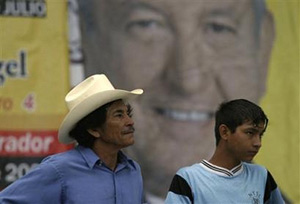 |
 |
 |
 News from Around the Americas | May 2006 News from Around the Americas | May 2006  
U.S. Immigration Debate Impacts Mexican Race
 Ioan Grillo - Associated Press Ioan Grillo - Associated Press


| | Two men stand in front of a large poster of Mexican presidential candidate Andres Manuel Lopez Obrador prior to the start of a rally next to the United States border in the city of Matamoros, Mexico on Saturday May 27, 2006. The immigration debate in the United States could determine more than the future of illegal immigrants. It may help pick Mexico's next president on July 2. (AP/Dario Lopez-Mills) |
The U.S. immigration debate could determine more than the future of illegal immigrants. It may help pick Mexico's next president July 2.

A reform that legalizes undocumented Mexicans in the U.S. could boost conservative candidate Felipe Calderon and keep the ruling National Action Party in power.

More walls and troops at the border could tip the balance in favor of Andres Manuel Lopez Obrador, sweeping Mexico into Latin America's shift to the left.

With an estimated 12 million Mexicans living in the United States, about half undocumented, any change in U.S. immigration policy provokes powerful reactions south of the border.

"It's the hot topic right now," said Mexican pollster Manuel Barberena. "The candidates all want to show they won't bend to the United States, while promising migrants they will get them a better deal north of the border."

U.S. immigration reform has been a cornerstone of the presidency of Vicente Fox. For nearly six years he has lobbied the U.S. government to allow more legal migration, meeting regularly with President Bush and traveling to California, Utah and Washington.

Lopez Obrador, a fiery leftist, has accused Fox of being weak when dealing with Washington. When Bush announced plans to send 6,000 National Guard soldiers to the border, Lopez Obrador called Fox a U.S. "puppet" and "lackey" for not vigorously opposing the measure.

While Fox can't seek re-election, his approval ratings could affect support for Calderon, his party's candidate, who has a slight lead in the polls over the once front-running Lopez Obrador.

"Lopez Obrador is using Fox as a patsy for Calderon. He has found it easier to run against Fox than Calderon because Calderon is slippery and difficult to get to," political analyst Federico Estevez said.

Calderon, a career politician and son of a National Action Party founder, staked out his own nationalist credentials on the immigration issue, attacking the U.S. Senate for approving 370 miles of triple-layer border fencing.

"These measures increase the social and human costs for migrants and only benefit criminal groups," he said.

Migration is most important to voters from poor villages that send much of their population north.

Lopez Obrador has been stumping in these villages and is gaining substantial support there, pollsters say. He kicked off his campaign in the impoverished hamlet of Metlatonoc on the day it held a funeral for a former resident hit by a car in Alabama.

Third-place candidate Roberto Madrazo of the Institutional Revolutionary Party, which ruled Mexico for 71 years until Fox's historic victory in 2000, is also hitting the immigration issue hard with peasant farmers, a key base of the party.

Madrazo began his campaign with a rally in the central Mexico farming town of Izucar de Matamoros, flanked by a migrant activist from New York and a young Indian woman whose brothers work in the United States.

Madrazo claims migration has increased under Fox because the president has abandoned the countryside.

"The solution to the migration problem is in Mexico, not the United States," he told The Associated Press in a recent interview. "We are the ones who have to create more jobs in the countryside."

Whoever wins, the migration policy of Mexico's next administration will probably vary more in style than substance.

With migrants sending home nearly $20 billion a year and reducing the pressure for job-creation in Mexico, it is likely that any president will go on pushing for Mexicans to work legally in the United States. But their tactics may differ.

The Harvard-educated Calderon would continue Fox's strategy of lobbying U.S. senators and holding get-togethers with the U.S. president, said George Grayson, a Mexico expert at the College of William and Mary in Virginia.

Lopez Obrador, a former Mexico City mayor who has headed demonstrations against state and federal governments, would likely work more closely with migrant protesters, Grayson said.

"I could see Lopez Obrador flying into the United States and joining demonstrations to put the pressure on," he said. "He believes in direct action. Look at his past. He has always mobilized people to achieve his political aims." | 
 | |
 |



